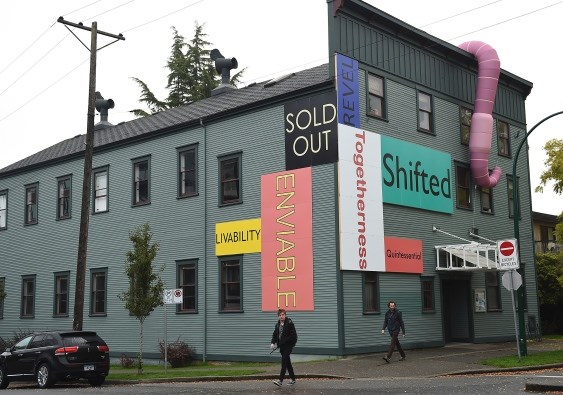In the ongoing saga of Vancouver's affordability woes and relentless development pressure, I've become conditioned to expect sad endings for many of the city's beloved institutions. But the announcement last week that the Western Front Society, a stalwart in the city's arts and culture scene since the 1970s, has been given $1.5 million in developer dollars to buy their building in Mount Pleasant is a plot twist I was not expecting.
This is undoubtedly great news — even if the odd exchange of cash does elicit a crisis in conscience for those who are critical of developers' influence on our city. We simply can't afford to lose any more of the heart and soul of our communities to the creeping march of the condo empire, and if keeping those cultural hubs in place means leveraging developer dollars, then so be it.
The deal, brokered by the city's Community Amenity Contribution (CAC) program, will also see C-Space/VIVO, Arts Factory and Grunt Gallery receive cash in hand from RIZE Alliance, the developer behind The Independent tower going up at Broadway and Kingsway. Straight-up handing out cash is a bold move for the city, which has traditionally meted out CAC funds for public infrastructure such as libraries, parks and community centres. But I like it. It denotes a belief that the existing cultural framework of the neighbourhood, which is gentrifying faster than almost any other area of the city, must be retained rather than replaced by “live/work studios” or other market-oriented products developers often try to sell to the creative classes who, as a rule, cannot afford them.
It may also serve as a bit of a balm for a community that was bitterly divided over the RIZE tower in the first place. It's an acknowledgement that good neighbourhoods are a mixture of the old and the new.
It also opens the door for other applications for CAC's the city might do well to contemplate. If we're now in the business of handing out cash to organizations recognized as being integral to a community's lifeblood, why stop there? Surely if the city can recognize the value of giving longstanding arts groups a permanent home, why not do the same for long-standing community members and open the door for organized residents to purchase shared property in their longtime homes?
The Western Front happens to sit on the corner of Scotia Street and Eighth Avenue —a street which is home to a rare concentration of 1960s-era rental buildings that, due to their age, still boast reasonable (by Vancouver standards) rents. They are also ripe for the kind of sale and remodelling that has many residents living in fear of renoviction. (I know, I used to rent a studio apartment in a building next to the Western Front for $750 — a price that felt like highway robbery.)
Already, that street has seen some of the buildings torn down for a market-oriented update, and the feeling is that once the RIZE building goes up and (please God) a rapid transit line appears along Broadway, that bastion of affordability, like many others in the city, will be gone. So too will be the artists, families and area residents that also make Mount Pleasant what it is.
What if the city used CAC funds to help organized residents pool resources, or match funds, to buy a few of those older rental buildings and shared houses, and turn them into a city-supported co-operative or cohousing? Certainly the logistics would take some figuring, but if we're going to dole out developer cash to safeguard entities that undoubtedly contribute to neighbourhood character, that should include maintaining housing options for existing community members.
The city has long held out against getting into the real estate business — save for its interventions in low-income and supportive housing. But with property assessments jumping exorbitantly year-over-year, condo prices poised to follow suit and no end in sight to the pressure on rental stock, it's time to reassess.
In a city whose residents increasingly languish in the gap between qualifying for low-income support and the ability to realistically pay market housing rates, every avenue to alleviate pressure on our housing stock must be explored. And while using CAC's to maintain older buildings might seem antithetical to the developer interests, it would likely alleviate some of now knee-jerk opposition to development we see in so many communities throughout the city.
The nimble retooling of the CAC program to accommodate the Western Front and the other arts groups shows that development and displacement needn't always be synonymous. It's proof that in the tired tale of Vancouver's affordability crisis, there just might be room for some happy endings.
@jm_barrett
Jessica.Barrett@gmail.com



